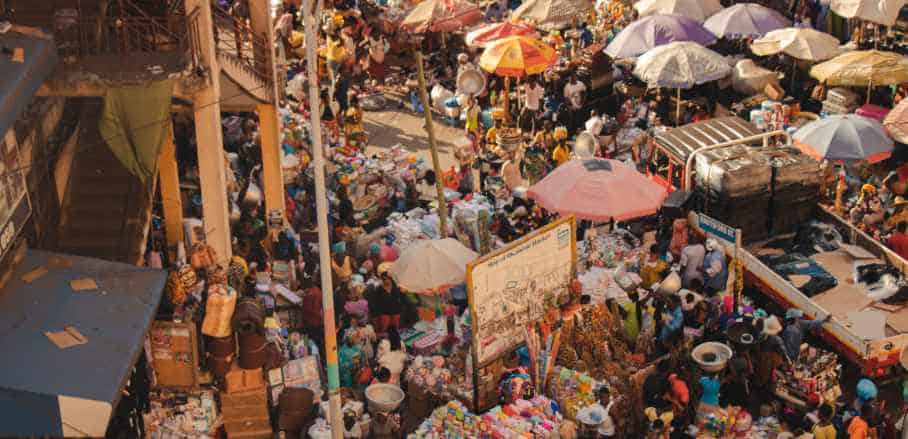Trading to Eat: How The Informal Economy is Hunger-Proofing Africa’s Cities
In many African cities, informal food traders sell everything from fresh produce to fried chicken feet at affordable prices to people who need food most – providing what is arguably Africa’s largest nutritional safety net.
Across the African continent, informal jobs account for three quarters of all non-agricultural livelihoods – and the trend is rising. This is particularly true for women and the urban poor who are not only the most vulnerable with regard to food insecurity but also face a compounding array of intersecting setbacks which structurally exclude them from meaningful participation in the formal economy.
As the International Labour Organization (ILO) notes:
In this way, informality offers a critical dietary lifeline that puts food on the table by opening small spaces of opportunity in an otherwise exclusionary employment landscape. Indeed, given the inability of the formal economy to absorb the rapidly growing number of urban youth into dignified employment, the informal economy is likely to become increasingly nutritionally significant as Africa’s youth bulge advances into the working age.
Creating Jobs Africa’s Youth Desperately Needs
The informal economy tends to create more jobs for a wider spectrum of people than equivalent competitors in the formal sector. In South Africa, for example, it is estimated that formal supermarkets account for around 75 per cent of all food trade and employ roughly 273,000 people. Small grocery stores and informal food vendors, on the other hand, account for 735,000 jobs despite controlling only 25 per cent of the food retail market. This demonstrates that dollar for dollar, the informal food economy far outperforms its formal counterpart at creating the jobs which Africa’s youth so desperately needs. Additionally, the informal economy tends to keep this money in circulation within low-income food insecure communities.
These informal economies are as diverse as the cities they support, spanning fashion, beauty, real estate, transport, IT, construction, security services, education, healthcare, sex work, religion, the arts and just about any other service imaginable. However, urban food-based enterprises account for the lion’s share.
Governing Informal Spaces Needs to Include a Gender Perspective
There is a clear gender bias to work within the African informal economy with women being 10 per cent more likely to work in the informal economy. Women assume a central role in raising, feeding, and caring for children and the elderly. This further compounds the importance of their livelihoods, and as such the critical role that the informal sector plays in early childhood nutrition. In Nairobi, selling fruit and vegetables is the leading income-generating activity for low-income women. Statistically, when given the choice women invest more in healthy food and education than men do. However, women cannot care for and maintain healthy food habits for their children when in a state of precariousness. Hence, from a perspective of food security, policies that seek to govern spaces of informality, need to be putting the needs of women – who bear the greatest burden of feeding and caring for children – at the centre of the agenda.
Shaking Off Stigmas
Stories of individual life journeys in contexts of informality are often read as tales of marginalised people facing poverty, discrimination, and barriers to secure labour markets, housing, and welfare. While these negative connotations are certainly true, there is more to it. In cities across South Africa for example, many traders say they prefer running their own businesses to the alternative of low-paid formal employment. Similarly, in Nairobi, the widespread emergence of vernacular terms like ‘hustling’ evokes an agentive struggle in the face of harsh circumstances, where opportunism, playfulness, and fierce persistence triumph over adversity.
The Informal Sector’s Potential to Eradicate Hunger
Unfortunately, the prevailing developmental visions for cities tend to problematise informality instead of valorising it as a solution space for food security. Although planners, politicians, influential residents, and investors pursue sterile, utopian visions of grand and orderly cities from which the chaos of informality has been erased, it need not be this way. To maximise the informal economy’s potential contribution to eradicating hunger, we need to valorise informal traders as positive co-creators of just and resilient cities. This means embracing informal trade through the creation of more enabling economic, regulatory, and spatial planning environments. This reduces the risks associated with informality while increasing the rewards. Therefore, the challenge is not simply the creation of new policies, but to work towards identifying regulatory obstacles that hamper the growth of the informal sector.
- Local Solutions, Global Impact: Municipal Markets and Climate Action - 23. January 2024
- Trading to Eat: How The Informal Economy is Hunger-Proofing Africa’s Cities - 31. January 2023
